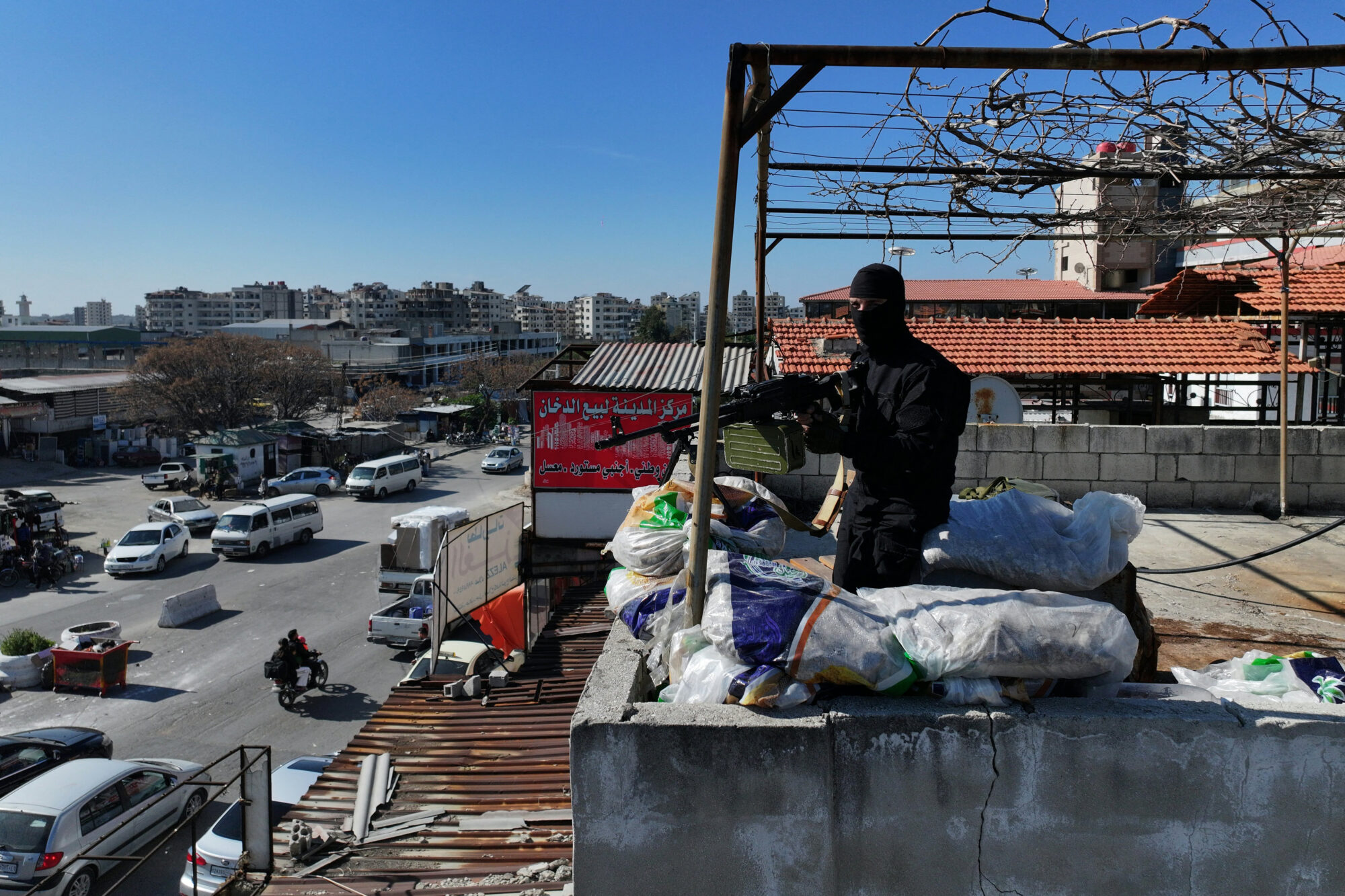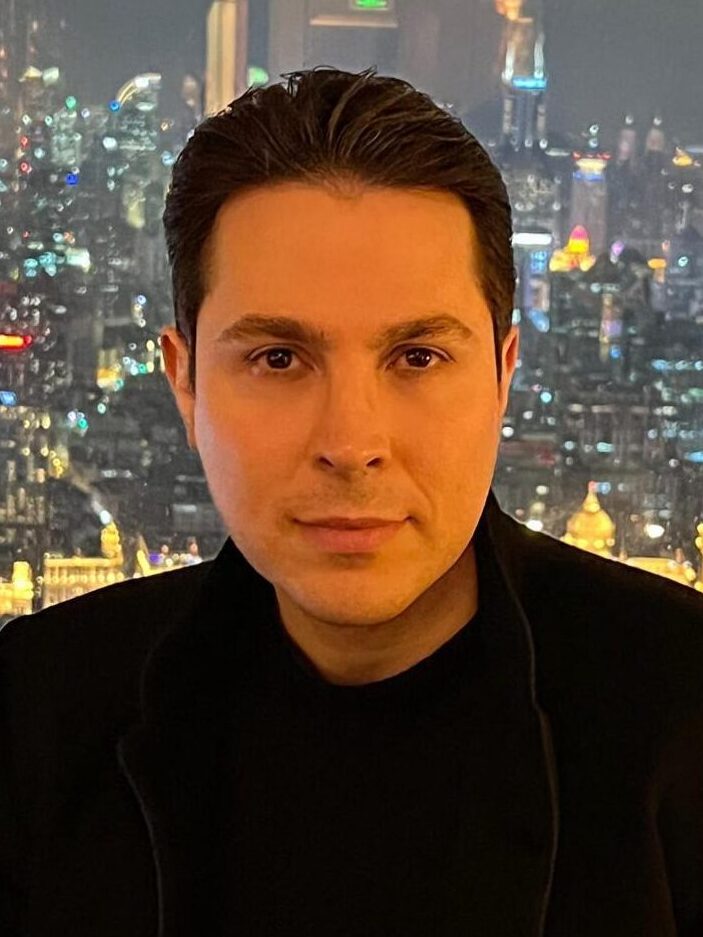
A guard at a checkpoint at the entrance of Jableh in Syria, on January 28, 2025
Maher Al Mounes / AFP
At a time when the European Union is considering lifting sanctions on the Syrian regime, Ribal al-Assad, founder of the Organisation for Democracy and Freedom in Syria, cousin of former ruler Bashar Al-Assad and well-known critic of the previous regime, warns of the dangers of this decision in an interview with europeanconservative.com.

The fall of Bashar al-Assad’s regime did not bring stability or democracy to Syria but rather the rise of a government dominated by Islamist extremists. The conflict, which began in 2011 as a popular uprising against the regime’s repression, turned into a prolonged civil war with the intervention of multiple international actors. While Assad held on with support from Russia and Iran, the opposition fragmented, allowing jihadist factions, many linked to Al-Qaeda and the Islamic State (ISIS), to gain ground.
The outcome accelerated when Russia, weakened by the war in Ukraine, reduced its support for Assad, leaving him without his primary military and economic backing. At the same time, Turkey maneuvered to install allied Islamist groups in power, securing positions for former leaders of ISIS and Al-Nusra in the new Syrian government.
With a collapsed state and no viable democratic alternative, figures with terrorist backgrounds managed to take high-ranking positions endorsed by certain international actors. Far from achieving peace, Syria has become a hotspot of instability and a sanctuary for extremism at Europe’s doorstep.
Honestly, I am shocked. Many are rushing to lift sanctions on the Syrian regime, arguing they could be reinstated if violence resurges. However, these atrocities are ongoing. Daily massacres are being committed. Recently, over ten people were killed in Arzej, more than 50 in Fahl, and several others in Homs. Kidnappings, killings, and discrimination against minorities, particularly the Alawites, are systematic. Employees are being dismissed based on sectarian affiliation, as seen in Latakia’s electricity directorate. Government facilities are being dismantled, impoverishing certain regions.
Despite these crimes, European leaders, including President Macron, are engaging with the perpetrators and even suggesting lifting sanctions. This approach is naive and reminiscent of Biden’s misguided policies in Afghanistan. How can we negotiate with jihadists? The European Union has never met with leaders of Hamas, Hezbollah, or Al-Qaeda. So why recognize a group whose leader was ISIS’s deputy commander? Their history of terrorism is well documented—from 9/11 to bombings in Madrid, London, and beyond. These militants have committed countless atrocities, killing thousands in Iraq, Syria, and beyond.
Several European countries, like France, seem to be replicating their past dealings with the Assad regime. France, for example, maintained silence on Hezbollah’s arms trade in exchange for control over Beirut and Tripoli ports. The same French company also operates the container terminal in Latakia, renewing its contract even after the regime’s actions. If France was truly an adversary of the Assad regime, why would it maintain these agreements?
Western governments are short-sighted, hoping to prevent jihadist fighters from returning to Europe by engaging with them. However, this approach is dangerous. Europol has reported thousands of radicalized fighters that are back in Europe, requiring immense surveillance resources. Now, extremists in Syria number around 40,000-50,000, with 20,000 being foreign fighters. If they stay in power, their numbers will only grow, posing a global threat. Haven’t we learned from past mistakes of appeasing jihadists?
Sanctions should remain in place until a new constitution guarantees equal rights for all citizens, irrespective of religion, ethnicity, or gender. The judiciary must be independent. Why should the West support a regime that does not share democratic values? If a government does not ensure equality among its citizens, we should not back it.
The only way forward is to rid Syria of extremism and implement genuine democracy. After years of war, a federal system is needed to rebuild trust. Syrians have lost family members, homes, and livelihoods. There is deep distrust and sectarian division, making it unrealistic to expect unity under a centralized system. A federal structure would respect cultural differences and provide regional autonomy, ensuring stability without fragmentation.

The conservative groups understand what is happening in Syria far better, undoubtedly. However, leftist parties should also recognize the dangers of extremism, particularly concerning minority rights, women’s rights, and human rights. Recently, videos surfaced showing extremists attacking LGBTQ individuals in Syria, threatening them with mutilation. Yet, some Western governments continue to engage with these groups, ignoring their fundamentalist agenda.
Europe must not legitimize these extremists. Islam is a beautiful religion, but its perverted interpretation by radicals cannot be accepted. When people migrate, they should respect the culture, laws, and traditions of their new country. Western governments must enforce this principle rather than tolerate ideological subversion.
Some countries are keen on returning Syrian refugees, especially those who initially stated they would go back if the Assad regime fell. However, many now fear returning under Islamist rule. While Assad’s regime was brutal, replacing it with jihadist extremists is worse. For years, I have worked to unite democratic forces into a viable alternative to dictatorship. Syrians desire genuine democracy, not another oppressive regime.
Under Trump, the U.S. successfully fought Islamist extremists, targeting them regardless of their affiliations. Some policymakers mistakenly considered alliances with Al-Qaeda against ISIS, forgetting their long history of attacks against the West. Trump rightly treated all Islamist extremist groups—whether Muslim Brotherhood, Hamas, Al-Qaeda, or ISIS—as threats.
In 2020, Trump ordered strikes against Al-Nusra leaders. While Al-Baghdadi was eliminated, Al-Jolani survived. However, his administration understood the need to eradicate all such groups. Unfortunately, today, we have heard little from Trump regarding renewed efforts against extremism.
Turkey’s expansionist ambitions also pose a serious threat. Ankara is pushing Islamist militias into Libya and consolidating power in Syria. If unchecked, these groups will threaten Jordan, Lebanon, Iraq, and the Gulf. Recent clashes at the Lebanon border highlight this growing instability. Arab states, except Qatar, are alarmed by Turkey’s increasing influence and support for extremists.
If Syria falls entirely under jihadist rule, it will become a global terror hub, attracting thousands more extremists. Western leaders must act decisively, not just for Syria’s future, but for their own security.
